- Since WW2 the global trade and financial system has primarily favoured the USA.
- Akin to all empires of old, the US had, and still has, a crucial role in ensuring the system’s stability, delivering continued US prosperity and hegemonic power.
- President Trump, and his acolytes, do not grasp the above, and through their foreign policy and trade decisions are hastening its decline, to the US’ significant detriment.
- A new nascent global trade system is now emerging, with the USA no longer at its centre. As a result, US power is waning faster than needs be.
Introduction
It is early days, yes, but initial data appears to be confirming our hypothesis that Trump’s “reciprocal” tariffs and zero-sum game ethos could not have come at a worse time for the USA. With the rise of China, the culmination of the long-building Indo-Pacific Tilt geopolitical era, the emergence of new economic blocs, and technological change, the world was already changing as it was, but Trump has unknowingly accelerated the decline of the USA’s hard and soft power. What’s so interesting about this is that Trump’s, and America’s, blind and incorrect belief in the natural and inevitable superiority of American power is actually the key factor that is undermining that same power so decidedly.
Historical Context
After WW2 the frameworks for a collection of systems that ensured the US’ global pre-eminence and hegemony were set in stone. The Bretton Woods system (1944) established the USD as the global reserve currency, giving the USA considerable power to incentivize and coerce other nations to do its bidding. It also built a stable international financial framework of fixed exchange rates, as well as establishing now key financial institutions such as the International Monetary Fund (IMF) and World Bank (WB). And, although the Bretton Woods system came to an end in the 1970s under Nixon, with exchange rates free-floating thereafter, much of the structures set out by Bretton Woods remained, as did the USD’s global dominance.
Add to this the Marshall Plan (1948-1951) where American dollars were diverted into the post-war reconstruction of Europe, which in turn assured the economic recovery of Europe and created vibrant markets for American goods to be exported into.
And, of course, the General Agreement on Tariffs and Trade (GATT, 1947) where signatory nations gradually dismantled trade barriers, propelling greater volumes of international trade and boosting mutual economic growth.
These measures combined ushered in a new era of economic growth, primarily across the Western world, throwing out the old zero-sum game ethos of the prior era, and fostering greater cooperation to mutual benefit. Above all nations the USA prospered most from this new framework, enjoying unprecedented prosperity and cementing its position as the prime economic power on the planet.
Those frameworks established the USA at the centre of the global economy, and gave it a level of economic, and therefore political and military, power that was hitherto unheard of.
Over the following decades the US well understood that it had to fulfill a stabilising role so as to sustain those frameworks and ensure its continued power. These included ensuring that Europe’s collective economy remained stable so as to allow European consumers to continue purchasing American goods, making US membership of NATO a key criterion for her continued economic success. It also included protecting and enabling global trade, including through the deployment of the US Navy to patrol shipping lanes and ensure key bottlenecks remained open.
This was the bargain; to ensure the US remained at the centre of the global economy, and so enjoyed the power dividends that that furnished, the US had to do its part politically and militarily around the world. This is why, for so many years, the USA has been the crucial broker in any dispute or conflict between nations – not so much anymore, as Trump is finding to his chagrin. Allies and trading partners implicitly understood this bargain, enjoying the economic benefits that sprang from it, and were content to pay homage to the USA and allow it to reap the biggest rewards in exchange for its maintenance of the system. Every US President over the decades understood the US’ position in this bargain, and also understood that although it came with costs to the US, the US would nonetheless reap the biggest dividends both economically and in terms of both hard and soft political power around the world. It was a fair deal all round.
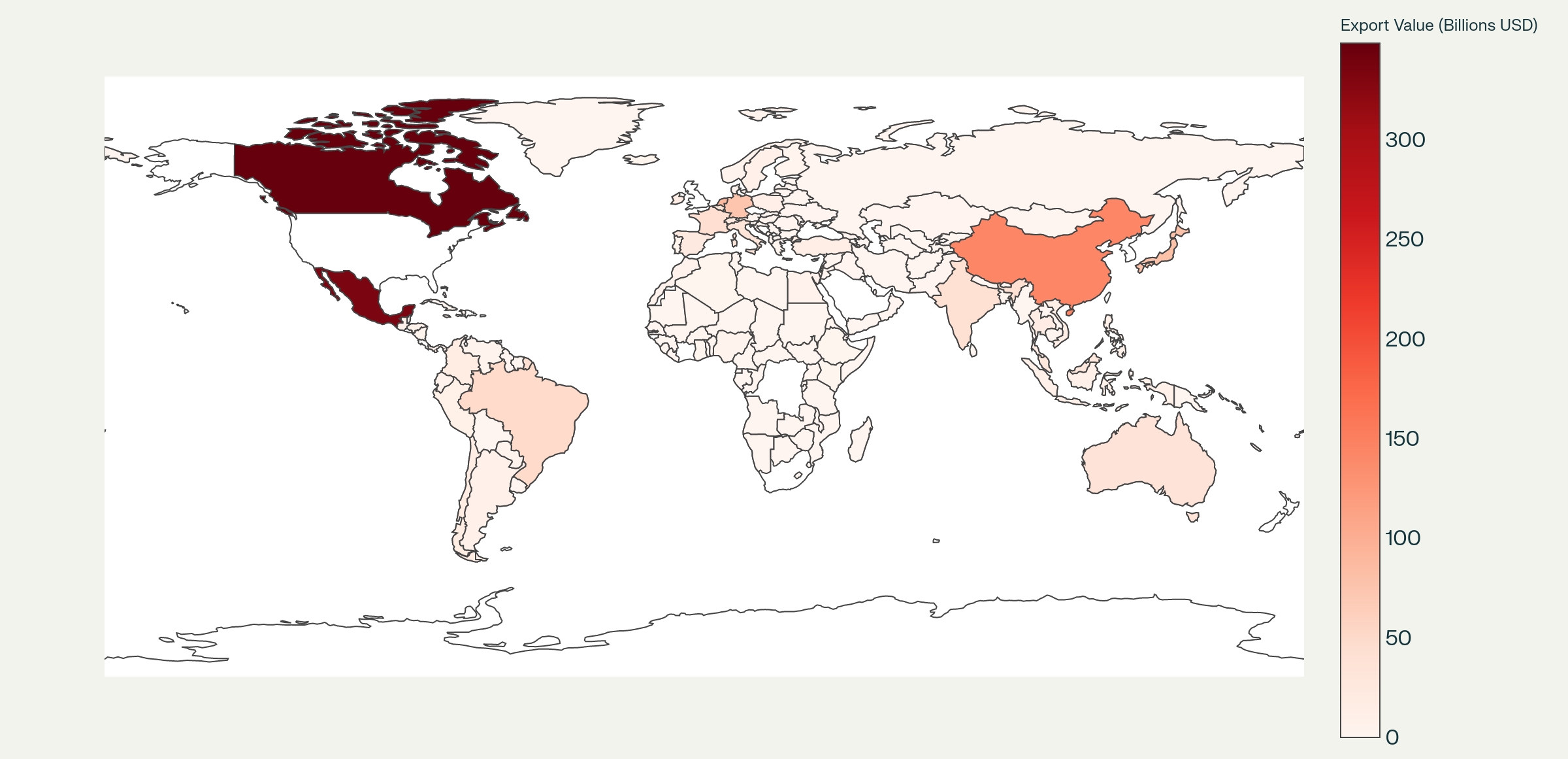
Fig 1. US Goods Exports by Country 2024 – USTR Data.
Indeed, so successful was this system for the USA that competing large powers such as China and Russia have long called for this system to be dismantled and a new, fairer global trade system to be established – one that does not favour the West so heavily.
And then Trump came along. Trump doesn’t understand the above. He thinks the system exists all on its own, and that any trade deficits are evidence of unfairness towards the USA, without realizing the tremendous benefits that the USA reaps from the system as it is. He believes in zero-sum, not mutual benefit; to Trump in every deal someone has to be the winner, and someone has to be the loser. Nor does he understand the role that the USA has to play in maintaining the system that nourishes and enriches it more than any other participant. He truly believes the neither qualified nor quantified mantra that Americans are taught from childhood – that the USA is the greatest country in the world, and on the strength of this notion he believes that the US’ economic, political, and military might is simply a product of the US’ DNA and its DNA alone. He simply does not recognize the crucial part that the post-WW2 system played, and continues to play, in propelling the USA to the top.
Nor does his administration understand this. Think of the Signal-gate incident, where Secretary of War (!) Hegseth and Vice President Vance openly discussed their disgust that the US should find itself taking military action against Yemen’s Houthis so as to ensure safe passage through the Red Sea and Suez Canal for trade shipping. They felt that the US would be “owed” in some transactional way by Europe for reopening this crucial trade route (roughly 12% of global trade transits the Suez Canal in a typical year). This discussion demonstrated a fundamental ignorance amongst Trump’s regime that it is absolutely central to the US’ own economic interests that key trade routes remain open, that the European market is sustained, and that the US is utterly obliged to use the power that it reaps from global trade to sustain exactly that power.
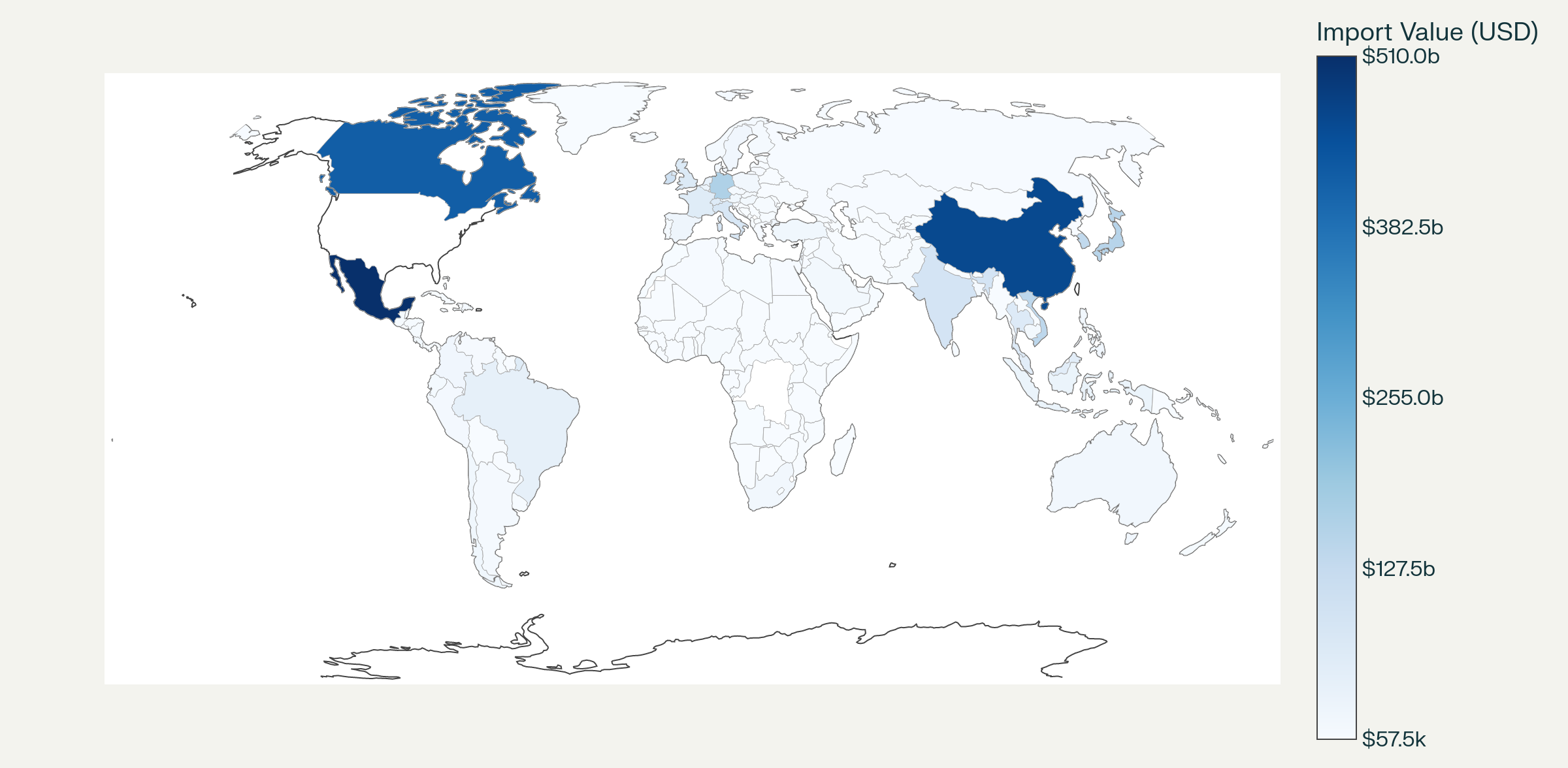
Fig 2. US Goods Imports by Country 2024 – USTR Data.
Tariffs
Now, with Trump’s zero-sum tariffs tantrum he is effectively bullying the rest of the world and expecting even more dividends from the bargain for the USA, whilst at the same time offering to do less in the US’ prime responsibility to maintain the system itself. And we are beginning to see the effects. When China brokered a détente between Iran and Saudi Arabia in 2023 we witnessed a key crack appear in the USA’s hitherto un-assailed power and influence. No longer was the USA the world’s central broker of deals, or resolver of conflicts – nations were beginning to look elsewhere for guidance, leadership and support. Now, to compound this loss of soft political power, numerous countries, and especially those within the growing BRICS+ bloc, are actively beginning to seek alternative markets for their goods and are beginning to turn their backs on the USA as a core supplier of both goods AND, crucially, services. Perceiving the USA as unreliable they are now both diversifying away from prior reliance on the USA for a range of products, and also diversifying away from exporting so heavily into the US, giving them option in the future to treat US custom no different to that of any other nation. No longer will the US be able to expect preferential treatment once its market, or products, are seen as no more important or lucrative as any of the other markets a nation is exporting into or importing from. As a result, the USA’s economic power, and by extension inevitably both its political and military power, is weakening.
See our September Macro Brief on China:
“On 9th September new data from China customs revealed the impact of the tariff spat – a 14.4% drop in two-way trade between the US and China and a 15.5% fall in exports. The US’ position as a trade partner with China fell to third against the ASEAN bloc and the EU bloc, although the US remains China’s single biggest trading partner as a standalone country. Importantly, whilst exports to the US gradually shrink, China has managed to significantly boost its exports to other markets and regions. These include an 8.6% increase in exports to ASEAN nations led by double-digit growth in exports to Vietnam, Thailand, and Indonesia. Exports to Africa exploded by 24.5%, and bilateral trade with African nations grew by 15.9%. It seems that the true impact of Trump’s tariff war will land in the US, and not in China.”
And our September Macro Brief on South Africa:
“Mark our words; it will not be long before we see a re-energisation of RSA’s ties with the likes of China, in particular. President Trump’s unshakeable, but mistaken, belief in the totality of American power is only succeeding in driving more and more nations in the opposite direction – see Xi Jinping, Narendra Modi, and Vladimir Putin’s warm conversations at the Shanghai Cooperation Organisation summit recently. We expect to see Cyril Ramaphosa, South Africa’s President, moving to make inroads with other BRICS+ members in coming weeks and months. Indeed, on Mon 8th September, at a virtual BRICS+ summit called for by Brazilian President Luiz Inacio Lula da Silva, Ramaphosa said “unilateral tariff actions are contributing to an increasingly protectionist environment, which poses great hardships and danger for the countries of the Global South. We are therefore supportive of meaningful BRICS initiatives that improve the resilience of our economies as BRICS countries … BRICS nations should now focus on strengthening and collaboratively diversifying their trade and investment partnerships with Africa, Asia, the Gulf, the Americas, and Europe.””
What about September’s Macro Brief on Brazil:
“The spat with the Trump administration is going from bad to worse, but Brazil is undaunted by Trump and Rubio’s threats, and will continue to pursue domestic justice as it sees fit. Brazil’s challenge to US tariffs at the WTO is ongoing, and will likely continue for a long while yet before any resolution will be found, but in the interim the nation is doubling down on its efforts to find other allies and trade partners, particularly within the BRICS+ bloc. All that Trump is succeeding in doing here is driving away one country after another, isolating the US, and ensuring that global trade continues unabated but without the US mega-consumer at its centre – considerably weakening the US’ power as he does so.”
We can see this clearly already; US exports of both goods and services are already falling, and the promised riches the US will extract from tariff revenues are increasingly failing to materialize. Aside from the fact that it is every day Americans and US importer companies that are actually paying the tariffs, and certainly not the exporting nations themselves, the volumes of goods now heading into the US market is falling precipitously. As we point out in our article Tariff Diplomacy and the Illusion of Surpluses we’re seeing exports into the USA falling off a cliff; where in 2024 the USA’s trade deficit with Nigeria was USD1.7Bn, by August of 2025 that had flipped to a USD576m surplus – not because US exports into Nigeria grew, but because Nigerian exports into the USA plummeted. Similarly, the US is now running surpluses of USD3.2Bn with Brazil, and USD2.3Bn with Egypt.
“At first glance, this looks like an American comeback. In reality, it is an illusion built on tariffs, shrinking volumes and political spin … This is where the rhetoric and reality diverge. Trump boasts of “billions” in tariff revenues. But if imports collapse, there is little left to tax. The US Treasury’s take shrinks along with the flow of goods. Americans get none of the promised bounty. Instead they face thinner shelves in Target, Costco and Walmart – and fewer choices at higher prices. There is no fiscal windfall, no export boom, just less trade all round. The idea that this shrinking import base could fund sweeping US tax cuts is fantasy – the billions simply aren’t there.”
The illusion is supported in the short term by US importers busily stocking up on foreign-made goods before tariffs hit, but the data now clearly shows that US exports both in goods and services are falling. Here’s an extract from September’s Macro Brief on Vietnam:
“We’re already seeing drops in US exports around the world, and this will continue … according to the US Bureau of Economic Analysis “the U.S. goods and services trade deficit increased in July 2025 according to the U.S. Bureau of Economic Analysis and the U.S. Census Bureau. The deficit increased from $59.1 billion in June (revised) to $78.3 billion in July, as imports increased more than exports. The goods deficit increased $18.2 billion in July to $103.9 billion. The services surplus decreased $1.1 billion in July to $25.6 billion.”
Not only did imports increase more than exports – probably as US importers tried to stock up their warehouses with goods before tariffs inflicted price increases – but importantly US exports of services shrank by $1.1Bn. This is crucial; whilst the US is the second biggest goods exporter on the planet after China, it is the biggest services exporter by a good margin. President Trump has (sensibly) avoided mentioning services alongside all of his tariffs rhetoric over goods because he really doesn’t want to shine a light on US services surpluses. In 2024 the US exported $1.15Tn in services worldwide and imported $841Bn resulting in a surplus of $309Bn, whilst it exported $2.1Tn in goods yet imported $3.3Tn resulting in a $1.2Tn deficit (bea.gov data). So, the US’ edge and surplus in services is reducing as trade partners eschew US products, at the same time as imports are (at least temporarily) surging. This isn’t quite working out how DJT planned …”
The Future
Yes, it is early days yet, but looking into the tea leaves, and analysing already available trade data, we’re confident that we can see a clear picture emerging. Where once the USA was the central, gluttonous consumer, gorging itself on cheap goods manufactured overseas, and reaping the economic, political and military power dividends arising, in coming years we will see a profound change that is decidedly not to the USA’s advantage.
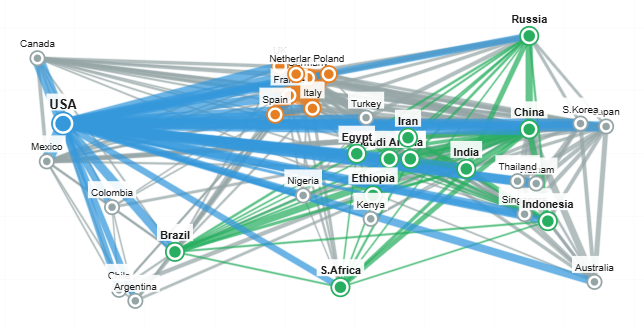
Fig 3. Current US-Centric Global Trade Visualization – 2024 USTR Data.
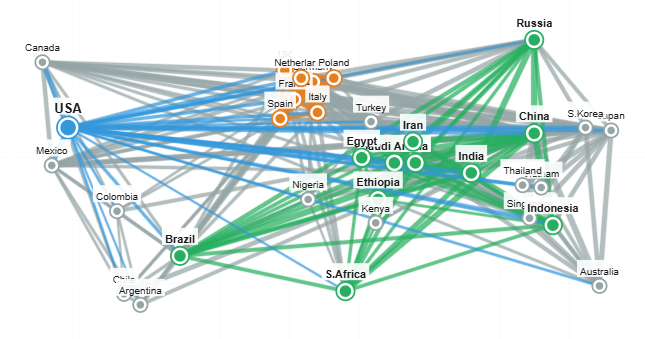
Fig 4. Future Multipolar Global Trade Visualization (symbolic data).
Key for Figs 3 and 4 (thicker lines represent greater bilateral trade volumes):![]()
![]()
![]()
![]()
Already we are seeing the BRICS+ bloc collaborating to increase trade with one another, choosing to eschew US goods in favour of each others’. In 2024 China purchased US$12.6Bn of US soybeans – about two billion bushels. This year so far it is just 200 million bushels. Instead of buying more from the USA instead, according to WSJ, China has invested US$285 million in Brazilian soybean production and this year so far has bought two billion Brazilian bushels. Worse, China just bought 1.3 million tons of soy beans from Argentina (a non BRICS+ nation) – true, this is no doubt heavily influenced by Argentina having suspended a 29% export tax on the product, making their beans a full US$3 cheaper per bushel than everyone else’s, but with tiny purchases of US soybeans, the US is pretty peeved at it nonetheless. Having already supported US soybean farmers to the tune of US$10Bn last year, Trump is now forced to consider a further US$10-14Bn in support this year unless he can convince Xi Jinping to buy American soybeans either when they meet in South Korea in a few weeks, or when Jinping visits the USA later this year.
The systemic change that the Russians and Chinese have long called for is happening right now – and Trump is unknowingly its primary architect. He is hastening the already clear decline of the US’ hegemonic power, and making that decline more inevitable and immediate than it was previously. Until he started throwing around his zero-sum tariff teddy, almost everyone around the world was content to live inside the current US-favouring system, but when Trump and his team failed to recognize the basic tenets of that system, and the US’ role in sustaining it, they simply incentivized everyone to look for an alternative … and now that alternative is becoming reality.
Conclusion
As we concluded in Requiem Colossus:
“Make no mistake; this is not an anti-American diatribe. It is instead a lament for the America that once was; a nation that championed freedom, justice, and human decency. That America, beautiful as the Roman goddess Libertas in whose image the Statue of Liberty was built, is gone. In her place stands a graceless bully, convinced of her own invulnerability, blind to the reality that her power was never absolute and was always dependent on others.
And now, for the first time in decades, the world is learning that it can live without America. Many nations have long wanted to ignore or defy the US, but fear, necessity, and power dynamics kept them in check. Trump has now given them justification to turn away.”
Over the next several months we are confident we will see increasingly clear data that confirms our hypothesis. US exports, of both goods and services, will steadily decrease over time. Intra-bloc trade between nations within BRICS+ especially, and likely the EU too, will increase to the point where the punitive effects of Trump’s tariffs are cancelled out. The US’ ability to wield soft power around the world, already considerably undermined by President Trump in his first few months in office, will further decline, with alternative players like China taking on an increasingly significant role.
Gradually the USA’s position at the centre of the global economy will morph into it being just one of several mega consumers, the same as the collective EU, or China. Simultaneously the USA’s political power will also diminish (indeed, arguably we have already seen this in Trump’s repeated inability to influence the course of major conflicts) to the point where the USA is just one of several major powers/ blocs that exert influence, and no longer the hegemon in a unipolar world. The USA’s power mix will indeed differ from that of other competitor nations/ blocs – its energy independence gives it an edge, biotech and digital governance standards are a differentiator, but nonetheless the USA will become just another big player in the maelstrom, and no longer THE player.
Unfortunately, now that Trump has launched this ship, there’s no turning it around – even should a true global statesman take the helm of the USA, back down and make amends, fulfilling the USA’s responsibilities to the system, the trust has been eroded too far and the likes of China and Russia will ensure that nobody forgets the betrayal. The USA’s ship has sailed. And we use the analogy of a ship deliberately here; empires don’t tend to implode in an instant, but instead decline imperceptibly over time until the stark truth finally becomes clear (see our Boiling Frogs article).
Whilst Trump was rambling contentedly to a room full of generals about resurrecting battleships, with Hegseth was lecturing them on “Beardos” and obesity, and then dramatically/ comically telling America’s adversaries to “F*ck Around and Find Out”, it is instead the USA that has f*cked around, and the USA that is beginning to find out.
There’s one central aspect that could change this all though, and it has nothing to do with Trump. If the USA wins the Artificial Intelligence race and is the first to reach Artificial General Intelligence (AGI) then the gargantuan technological advantage that that confers could propel the USA to a level of economic and political power that no other nation, no other bloc, nay even the entire planet of nations combined, could compete with.
